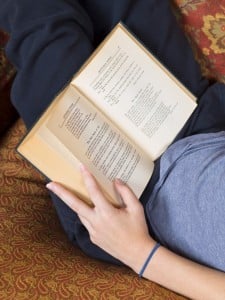 Like many people, I discovered the writings of Rainer Maria Rilke in college. I took a yearlong Western Civilization class—nine months on history and literature from ancient Greece through Freud—and during the spring term we read Letters to a Young Poet.
Like many people, I discovered the writings of Rainer Maria Rilke in college. I took a yearlong Western Civilization class—nine months on history and literature from ancient Greece through Freud—and during the spring term we read Letters to a Young Poet.
When I remember the course, certain images stand out:
Reading Oedipus Rex on the lawn outside the life sciences building and overhearing a student pronounce “Khomeini” with the same initial sound as “challah” (this would have been a month or so before the taking of American hostages). Getting an A+ (my only one in college) on a paper applying Civilization and Its Discontents to D. H. Lawrence’s story “The Prussian Officer.” Hearing our Milton professor speak of Shakespeare’s “two-backed beast” (what this had to do with Paradise Lost I cannot recall). Covering entire paragraphs of Letters to a Young Poet with my pink highlighter.
Recently, I saw Woody Allen’s latest movie, To Rome With Love, in which the aspiring-actress played by Ellen Page quotes Rilke (“You must change your life!”) as yet one more example of the character’s pretension and shallowness.
But when I was eighteen years old and studying in an empty classroom of the architecture building with my boyfriend, Rilke’s words electrified me. When I read for the first time, sentences such as, “You ask whether your verses are any good,” I held my breath. The hairs on the back of my neck stood up. I had never read anything like that before, and I had reacted to very few assigned readings so viscerally.
I hung onto my pink-highlighted paperback copy, of course, and a few years later my mother bought me a hardcover edition, translated by Stephen Mitchell, with a lovely jacket and matching endpapers, for a birthday gift. I kept the book on my night table, took it with me on retreats, read it when I felt stuck—in life or in writing.
Over the years, other passages have spoken to me with the immediacy of that first encounter. During a particularly painful time, when almost every waking moment terrified me, I came across the dragons and felt myself open up to something larger and wiser and more eternal than my fear.
Perhaps all the dragons in our lives are princesses who are only waiting to see us act, just once, with beauty and courage. Perhaps everything that frightens us is, in its deepest essence, something helpless that wants our love.
I would not have thought in terms of God then, but I do now.
Several months ago, one of my students from the Glen Online wrote to me about discovering Rilke’s Book of Hours. I’d been meaning for years to get my hands on a copy, and so I picked one up.
Odd that with my devotion to Letters and to one of Rilke’s poems about the annunciation, I’d never read Book of Hours. So I began: One poem every morning before centering prayer.
Indeed, many of the poems seem to lead directly into centering prayer. For example, I, 3 (the translation is by Anita Barrows and Joanna Macy): “When I lean over the chasm of myself— / it seems / my God is dark / and like a web: a hundred roots / silently drinking.”
Or, from I, 6: “You, God, who live next door— / If at times, through the long night, I trouble you / with my urgent knocking— / this is why: I hear you breathe so seldom…. / As it happens, the wall between us / is very thin. Why couldn’t a cry / from one of us / break it down? It would crumble / easily. / It would barely make a sound.”
I don’t read German, or understand much beyond Ich, Du, Gott and a few simple nouns, but each morning, before reading the English, I speak aloud to myself, quietly, the German original.
I know I’m garbling the pronunciation, but it doesn’t matter. I like the sounds, just as I do when reading Dante aloud. And not only the sounds, I enjoy the anticipation, the holding-my-breath quality of knowing that the English words sit right there, across the gutter of the page.
My glance can slide right over and give me instant comprehension. But I don’t want that, not yet.
Until this morning and writing this post, I’d thought my reason for returning to Rilke lay in my appreciation for the meaning and craft of his poems and for how they speak directly to God.
But now I think, too, of the unspoiled enthusiasm I once felt, the dry-throated awe, as an eighteen-year-old with a pink highlighter in hand. It’s that, too, I want to reclaim. It seems a good posture with which to sit for twenty minutes in silence.










